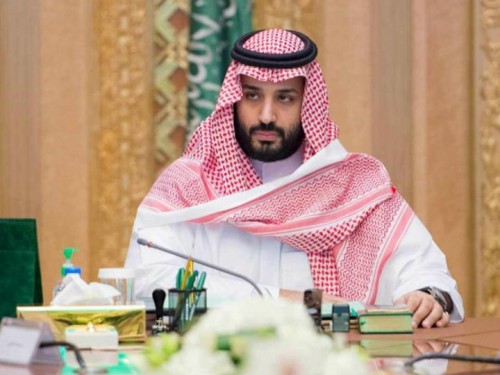Saudi Clerics Detained in Apparent Bid to Silence Dissent

2017-09-13 - 6:05 p
Bahrain Mirror- Reuters: Several prominent Saudi clerics have been detained in an apparent crackdown on potential opponents of the conservative kingdom's absolute rulers amid widespread speculation that King Salman intends to abdicate in favor of his son.
Saudi sources told Reuters that Salman al-Awdah, Awad al-Qarni and Ali al-Omary were detained over the weekend. Officials could not be reached or declined to comment.
All three are outside the state-backed clerical establishment but have large online followings. They have previously criticised the government but more recently kept silent or failed to publicly back Saudi policies, including the rift with Qatar over supporting the Muslim Brotherhood.
Awdah was imprisoned from 1994-99 for agitating for political change and leadership of the Brotherhood-inspired Sahwa (Awakening) movement. He later called for democracy and tolerance during the ‘Arab Spring' uprisings of 2011.
Saudi officials have dismissed reports that the king may soon pass the throne to Crown Prince Mohammed bin Salman, who already dominates economic, diplomatic and domestic policy.
But the al-Saud family has always regarded Islamist groups as the biggest internal threat to its rule over a country in which appeals to religious sentiment cannot be lightly dismissed and an al Qaeda campaign a decade ago killed hundreds. In the 1990s, the Sahwa demanded political reforms that would have weakened the ruling family.
"Mohammed bin Salman is very likely to be the next king but any dissenting voices that could challenge this succession could also be considered destabilizing from the regime perspective," said Jean-Marc Rickli, head of global risk at the Geneva Centre for Security Policy.
"You put that in the context of the Qatar rift and it is very difficult right now in the Gulf to have an opinion that is not considered biased or adversarial because the situation is so polarized on all sides."
Saudi Arabia, the United Arab Emirates, Bahrain and Egypt cut diplomatic and transport links with Qatar in June over its alleged support for Islamist militants, a charge Doha denies.
‘HYPERSENSITIVE'
In the past two years, Crown Prince Mohammed has launched radical reforms to foster economic diversity and cultural openness, testing the kingdom's traditions of incremental change and rule by consensus.
Resistance has not been met kindly, with the authorities increasingly silencing independent actors, said Stephane Lacroix, a scholar of Islam in Saudi Arabia.
"It's a much broader attempt to crush Islamists regardless of whether they act in opposition or not," he said. "This (the arrests) would be [Prince Mohammed] and the regime trying to impose a much stricter political order."
The crackdown is not limited to Islamists. Civil liberties monitors say freedom of expression is increasingly constrained in Gulf Arab states including Saudi Arabia.
"There is a general climate of being hypersensitive and almost paranoid," said Madawi al-Rasheed, visiting professor at the Middle East Centre, London School of Economics. "There is no room for any kind of dissent at the moment."
The government toughened its stance following the Arab Spring after it averted unrest by increasing salaries and other state spending but the Brotherhood gained power elsewhere in the region.
The group represents an ideological threat to Riyadh's dynastic system of rule, and its use of oaths of allegiance and secret meetings are anathema to the Saudis.
It was listed by Riyadh as a terrorist organization in 2014 and diplomats and analysts say there is little prospect that would change.
Taking power in January 2015, King Salman initially appeared willing to allow the Brotherhood a role outside politics, for example by not stopping affiliated preachers such as Awdah from speaking publicly on religious or social issues.
That appears to have changed in recent months, as a shift in the official discourse targeted Islamists and arrests increased, said Lacroix.
"What happened a couple of days ago is an acceleration of the process," he said, although it is unclear what specifically prompted the detentions.
Awdah tweeted on Friday welcoming a report that suggested the row between Qatar and other Arab countries may be resolved.
"May God harmonize their hearts for the good of their people," he wrote after a telephone call between Crown Prince Mohammed and Qatar's Emir Sheikh Tamim bin Hamad al-Thani.
STANDING IN THE MIDDLE
Awdah comes from Buraidah, heartland of the kingdom's ultra-conservative Wahhabi school of Islam.
Criticism of the ruling family in the 1990s earned him praise from Osama bin Laden, whom he eventually denounced. His Sahwa movement was later undermined by a mixture of repression and co-optation.
Some clerics, however, maintained large followings through YouTube sermons. Awdah has 14 million Twitter followers.
He supported resistance to U.S. forces in Iraq as "jihad", or holy war, but then emerged as an ally in the government's campaign against violent jihadists.
In 2011, Awdah called for elections and separation of powers, principles antithetical to strict Islamist ideology. He has since been largely quiet on issues of domestic reform.
Qarni, who was detained at home in Abha in Saudi Arabia's south, had also expressed support for reconciliation with Qatar, hopes for which were quickly dashed when Saudi Arabia ended any dialogue with Qatar, accusing it of "distorting facts".
"It seems today in Saudi Arabia that not supporting openly and enthusiastically what is happening against Qatar basically makes you an agent of Qatar," said Lacroix.
"People who don't take a stance stand in the middle, and there's no middle ground for the Saudis now."
- 2022-07-07Israel Reaches Record Trade Increase With Arab States Under Abraham Accords
- 2022-06-10Israeli PM Bennett Visits Abu Dhabi, Meets with UAE President
- 2022-06-10Israelis to be Allowed into Qatar for World Cup, Officials Say
- 2022-06-06Biden should not Visit Saudi, Meet Crown Prince: US Lawmaker Adam Schiff
- 2022-06-01Israel Signs UAE Free Trade Deal, Its First in Arab World